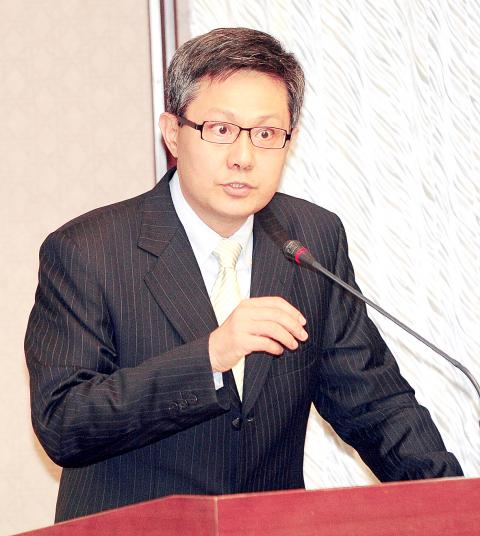Signing a “peace accord” with Beijing could lead to Taiwan being considered part of “China’s internal affairs” and complicate foreign intervention, National Taiwan University College of Law professor Chiang Huang-chih (姜皇池) said yesterday.
The idea of signing a cross-strait peace accord has waxed and waned since the creation of the so-called “1992 consensus” and was most avidly discussed after former president Ma Ying-jeou (馬英九) took office in 2008, Chiang said.
The “1992 consensus” — a term former Mainland Affairs Council chairman Su Chi (蘇起) in 2006 admitted making up in 2000 — refers to a tacit understanding between the Chinese Nationalist Party (KMT) and the Chinese Communist Party (CCP) that both sides of the Taiwan Strait acknowledge there is “one China,” with each side having its own interpretation of what “China” means.

Photo: Chen Chih-chu, Taipei Times
Ma spoke about signing a peace accord in his 2008 inaugural speech and it was in 2016 also adopted by then-KMT chairwoman Hung Hsiu-chu (洪秀柱) in the party’s policy guidelines.
The idea was broached again following a Jan. 2 speech by Chinese President Xi Jinping (習近平) in remarks on Jan. 5 by 21st Century Foundation chairman Kao Yu-jen (高育仁), who said that both sides of the Taiwan Strait should establish a similar historical view, initiate political dialogue and sign an armistice.
Kao is the father-in-law of former New Taipei City mayor Eric Chu (朱立倫), who has declared his intention to run for president next year.
Documents handling peace between nations include peace treaties, ceasefire agreements and armistices, which are considered legally binding in terms of international law, as well as peace accords, Chiang said yesterday.
The precondition to a peace accord is the conclusion of a war, which implies the cessation of hostilities between an internationally recognized government and rebels, or between multiple political entities within a nation, he said.
“As there is neither a state of war nor an armed conflict between Taiwan and China, there is no war to be halted,” meaning the need to sign a cross-strait peace accord is questionable, Chiang said.
Saying that a peace accord should be signed would be an acknowledgement that current or future cross-strait conflicts are a continuation of the Chinese Civil War between the KMT and the CCP, making cross-strait relations “China’s internal affairs” and increasing the difficulty of international intervention, he said.
Cross-strait relations being identified as “China’s internal affairs” would deprive US arms sales to Taiwan of international legitimacy, he added.
Taiwan should carefully consider what message it would be sending to the international community if it agrees to an armistice with China, Chiang said, adding that the nation could lose much if pressured into negotiating under the threat of conflict.

INVESTIGATION: The case is the latest instance of a DPP figure being implicated in an espionage network accused of allegedly leaking information to Chinese intelligence Democratic Progressive Party (DPP) member Ho Jen-chieh (何仁傑) was detained and held incommunicado yesterday on suspicion of spying for China during his tenure as assistant to then-minister of foreign affairs Joseph Wu (吳釗燮). The Taipei District Prosecutors’ Office said Ho was implicated during its investigation into alleged spying activities by former Presidential Office consultant Wu Shang-yu (吳尚雨). Prosecutors said there is reason to believe Ho breached the National Security Act (國家安全法) by leaking classified Ministry of Foreign Affairs information to Chinese intelligence. Following interrogation, prosecutors petitioned the Taipei District Court to detain Ho, citing concerns over potential collusion or tampering of evidence. The

Seventy percent of middle and elementary schools now conduct English classes entirely in English, the Ministry of Education said, as it encourages schools nationwide to adopt this practice Minister of Education (MOE) Cheng Ying-yao (鄭英耀) is scheduled to present a report on the government’s bilingual education policy to the Legislative Yuan’s Education and Culture Committee today. The report would outline strategies aimed at expanding access to education, reducing regional disparities and improving talent cultivation. Implementation of bilingual education policies has varied across local governments, occasionally drawing public criticism. For example, some schools have required teachers of non-English subjects to pass English proficiency

‘FORM OF PROTEST’: The German Institute Taipei said it was ‘shocked’ to see Nazi symbolism used in connection with political aims as it condemned the incident Sung Chien-liang (宋建樑), who led efforts to recall Democratic Progressive Party (DPP) Legislator Lee Kun-cheng (李坤城), was released on bail of NT$80,000 yesterday amid an outcry over a Nazi armband he wore to questioning the night before. Sung arrived at the New Taipei City District Prosecutors’ Office for questioning in a recall petition forgery case on Tuesday night wearing a red armband bearing a swastika, carrying a copy of Adolf Hitler’s Mein Kampf and giving a Nazi salute. Sung left the building at 1:15am without the armband and apparently covering the book with a coat. This is a serious international scandal and Chinese

NEGOTIATIONS: The US response to the countermeasures and plans Taiwan presented has been positive, including boosting procurement and investment, the president said Taiwan is included in the first group for trade negotiations with the US, President William Lai (賴清德) said yesterday, as he seeks to shield Taiwanese exporters from a 32 percent tariff. In Washington, US Trade Representative Jamieson Greer said in an interview on Fox News on Thursday that he would speak to his Taiwanese and Israeli counterparts yesterday about tariffs after holding a long discussion with the Vietnamese earlier. US President Donald Trump on Wednesday postponed punishing levies on multiple trade partners, including Taiwan, for three months after trillions of US dollars were wiped off global markets. He has maintained a 10 percent